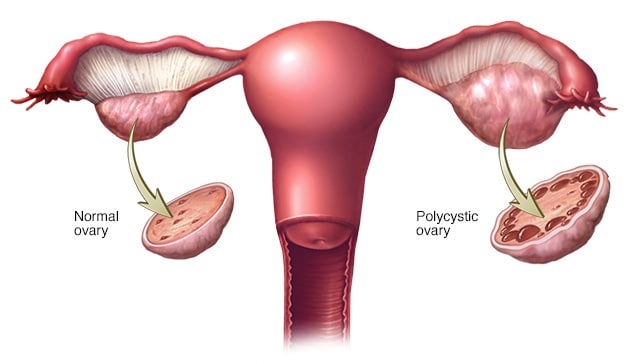Polycystic Ovary Syndrome

Polycystic ovary syndrome (PCOS) is an issue with hormones that occurs during the reproductive years. If you have PCOS, you might not have periods regularly. Or on the other hand you might have periods that last many days. You may likewise have an over the top hormone called androgen in your body.
With PCOS, many little sacs of liquid foster along the external edge of the ovary. These are called cysts. The little liquid filled pimples contain immature eggs. These are called follicles. The follicles fail to deliver eggs regularly.
The specific reason for PCOS is unknown. Early diagnosis and treatment along with weight loss might bring down the risk of long term complications like type2 diabetes and heart disease.
Symptoms
Symptoms of PCOS often start around the time of the first menstrual period. Sometimes symptoms develop later after you have had periods for a while.
The symptoms of PCOS vary. A diagnosis of PCOS is made when you have at least two of these:
- Irregular periods. Having few menstrual periods or having periods that aren't normal is common signs of PCOS. So are having periods that keep going for a long time or longer than is normal for a period. For example, you could have less than nine periods per year. And those periods might happen over 35 days apart. You might experience difficulty getting pregnant.
- Too much androgen. High levels of the hormone androgen might bring about excess facial and body hair. This is called hirsutism. Sometimes, serious acne and male-pattern hair sparseness can occur, as well.
- Polycystic ovaries. Your ovaries may be bigger. Many follicles containing immature eggs might foster around the edge of the ovary. The ovaries probably won't work the way in which they ought to. PCOS signs and symptoms are typically more severe in people with obesity.
When to see a doctor
See your medical care supplier assuming that you're stressed over your periods, in the event that you're experiencing difficulty getting pregnant, or on the other hand in the event that you have indications of abundance androgen. These could remember new hair growth on your face and body, Acne and male-pattern baldness.
Causes
The exact cause of PCOS isn't known. Factors that might play a role include:
Insulin resistance. The fact that the pancreas makes insulin a hormone. It permits cells to supply use sugar, your body's essential energy. If cells become impervious to the activity of insulin, glucose levels can go up. This can make your body make more insulin to attempt to cut down the glucose level.
An excess of insulin could make your body act over the top with the male hormone androgen. You could experience difficulty with ovulation, the cycle where eggs are let out of the ovary.
One sign of insulin obstruction is dim, smooth patches of skin on the lower part of the neck, armpits, and crotch or under the bosoms. A greater hunger and weight gain might be different signs.
Low grade inflammation. White blood cells make substances in light of infection or injury. This reaction is called low-grade inflammation. Research shows that people with PCOS have a type of long-term, low-grade inflammation that leads polycystic ovaries to deliver androgens. This can lead to heart and blood vessel issues.
Heredity. Research proposes that specific qualities may be connected to PCOS. Having a family history of PCOS might assume a part in developing the condition.
Excess androgen. With PCOS, the ovaries might deliver high levels of androgen. Having an excessive amount of androgen disrupts ovulation. This implies that eggs don't develop regular basis and aren't set free from the follicles where they develop. Excess androgen also can result in hirsutism and acne.
Blog List
WHAT IS A BLASTOCYST TRANSFER ROUTINE?
How To Improve The Quality Of Egg For IVF Naturally?
POLYCYSTIC OVARY SYNDROME DIAGNOSIS AND TREATMENT
6 Ways To Eliminate The Chances Of Infertility
How is the Infertility Journey for Non-Carrying Partners?
Fertility treatments lead to twins, triplets, or more
Difference between IVF and ICSI Treatment:
What is the Difference Between IVF and IUI?
Managing relationships during IVF
Polycystic ovary syndrome (PCOS) affects pregnancy
Understanding male infertility
Fertility Terminology & Abbreviations
Preimplantation genetic testing for genetic conditions
 Healthin
Healthin